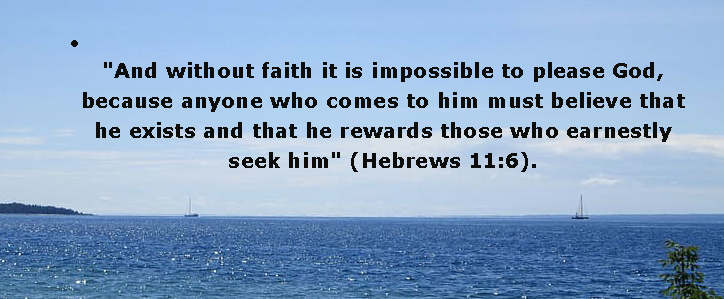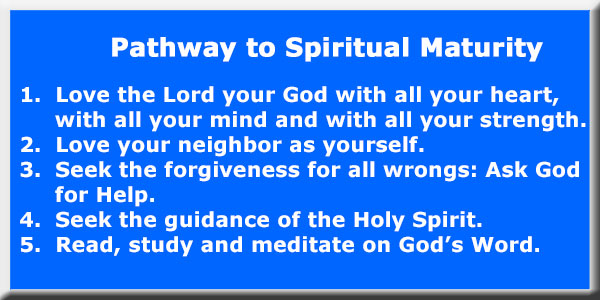What is the Meaning of Faith?
What is the meaning of faith? Christians live by faith. The challenge is to understand the difference in Christian faith and common everyday faith.
The word faith is used in everyday life. But it is not always understood. The reason is because of the many aspects of the definition and the many different ways the word faith is used in everyday conversation. The sheer number of ways faith is defined leads to confusion. Look at the number of meanings given by Merriam-Webster.

Merriam-Webster defines faith as:
· Allegiance to duty or person
· Fidelity to one's promises
· Belief and trust in and loyalty to God
· Belief in the traditional doctrines of a religion
· Firm belief in something for which there is no proof
· Something that is believed especially with strong conviction
Our objective in this article is to understand the definition of faith in the context of Christian faith. How does the Bible define faith? Hebrews chapter 11, verse 6 says, "Without faith, it is impossible to please Him." It is important to know what the Bible says about faith.
In chapter 11, verse 1, the writer of Hebrews defines faith as, "Now faith is the substance of things hoped for, the evidence of things not seen." Faith is substance, defined as any material that possesses physical properties. All substance starts at the subatomic level, which the human eye cannot see. Faith is required to assure us that they exist.
Christian faith is about trusting God and His promises when we can't see the outcome. If we knew the outcome, we would not need faith. It is a vital aspect of our relationship with God, guiding us to rely on Him and His plan. No one has seen God, which means to believe in God, we must trust in Him by faith.

Faith Begins with
the Word of God
Faith begins with acknowledging God as revealed in the Bible. God is described as Abba or heavenly daddy. He is kind, gracious, unchanging, faithful, merciful, and steadfast. He is also omniscient (all-knowing), omnipotent (all-powerful), and omnipresent (present everywhere at the same time).
God is an invisible God. Since we cannot physically see God, we must believe in God through faith.
What Is the Meaning of Faith
in the Bible?
Hebrews 11:1 says, "Now faith is the assurance of things hoped for, the conviction of things not seen." This verse leads us to include the words confidence and trust. Our faith allows us to accept those things of God which we cannot see. We have confidence that God exists and that He is always present. For example, when we talk to God, we are confident that God hears us.
An excellent example of what's the meaning of faith is found in the life of Abraham. Abram (before God changed his name) believed the Lord and the Lord reckoned it to him as righteousness (Genesis 15:6).
God told Abram in a vision that he would have descendants too numerous to count. God had Abram look in the heavens at the stars to illustrate the number of descendants he would have—too many to count. Even though Abram was approaching 100 years old, he believed God. Abram placed his faith in God.
Paul had this to say about Abraham's faith. "Hoping against hope, he believed that he would become 'the father of many nations,' according to what was said, 'So shall your descendants be.' He did not weaken in faith when he considered his own body, which was already as good as dead (for he was about a hundred years old), and the barrenness of Sarah's womb. No distrust made him waver concerning the promise of God, but he grew strong in his faith as he gave glory to God, being fully convinced that God was able to do what he had promised. (Romans 4:18-21).
Abraham believed God. He showed the conviction of things not seen, which illustrates the meaning of faith.
Verses that
answer the biblical question, "What is the meaning of faith?"
Christian Faith is based on the Word of God. The Word is the guiding light. Three verses that help us to understand what is the meaning of faith are:
· "Faith comes by hearing and hearing by the Word of God" (Romans 10:17).
· 2 Corinthians 5:7: "For we live by faith, not by sight."
· Hebrews 11:6: "And without faith it is impossible to please God, because anyone who comes to him must believe that he exists and that he rewards those who earnestly seek him."
Faith: Past and
Future
We often think of faith as it applies to the future. But what about the past? Since we were not there in the past, those events, such as the creation of man, must be taken on faith. Do you believe that God created man in the Garden of Eden? If you believe this, then you must believe it in faith. You were not there to witness their creation.
We look back to creation with faith in what we have not seen. We must believe that Noah built the ark because we were not there. How about the parting of the Red Sea? Again, we were not there to see these events; if we believe them, we must believe them in faith. What about Jesus dying on the cross? We accept this by faith.
It doesn't matter if you are looking toward the future or looking backward; faith is required. Part of faith is trusting that God will provide for you and that God is with you each step of the way.
Answer to the Question:
What is the
meaning of faith?
Just because you do not see something does not mean it doesn't exist. We have not seen thousands of people on this earth, but that does not mean they do not exist. It is the same with cells, molecules, and atoms. They exist even though we cannot see them with our physical eyes.
By faith, we believe that God exists. Even though we cannot see God, our actions show our faith. Our faith is demonstrated when we act on things we cannot see.
